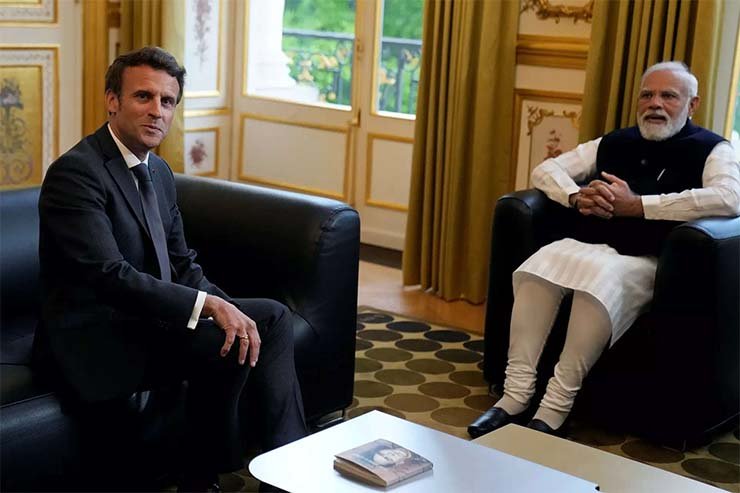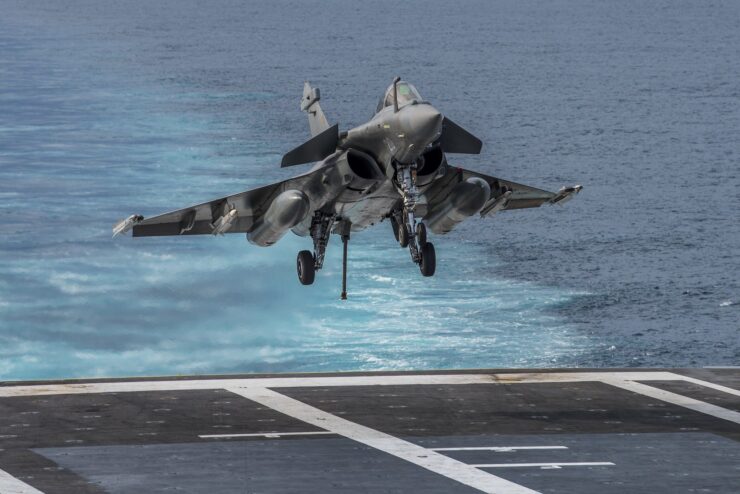
France landing large military contracts from their Indian partner: It is customary, in France, to associate diplomatic strengthening of ties to the inking of military contracts by French firms. India has been considerably upgrading and reinforcing its military apparatus, namely by calling upon French firms to supply them with new-generation equipment.
New Delhi is investing its growing role as a major player in the Indo-Pacific ocean, in this particular case by purchasing three of France’s Scorpene-class submarines.
Additionally, India is adding 26 naval Rafale fighter jets to the 36 ground-based versions purchased in 2015. “The delivery of these 26 fighters over the next two-three years would total an inventory of 62 Rafale variants in India’s arsenal, not an insignificant number. Hence, increasing this quantity further, according to some retired senior fighter pilots, to meet the IAF’s requirement for 114 MRFA makes ‘immense operational, commercial and logistical sense”, senior analyst Rahul Bedi writes
These acquisitions are merely the latest implementations of a strategic relationship that has developed sustainably over the past 25 years. Defence interactions had even begun before the official partnership was inked. Sputnik reporter Pawan Atri writes: “India ordered its first batch of 40 Mirage-2000 planes in 1982 before they were inducted into service in 1986.
France and India like to remind that they are ‘naturally compatible’ allies. Their common desire to maintain warm links with allies but also to protect their strategic independence can be considered the bedrock of this special relationship
A subsequent contract for nine more aircraft was signed in 1986 before they were delivered to India’s flying force in the 1990s. While five of these jets were handed to the IAF in 1990, two each were delivered in 1992 and 1994.” Not to mention two more aircraft, which have only recently been transferred.
A partnership that goes back a long way
France and India like to remind that they are “naturally compatible” allies. Their common desire to maintain warm links with allies but also to protect their strategic independence can be considered the bedrock of this special relationship, and France and India are neighbouring countries of the Indian Ocean, via French overseas territories, Mayotte and Reunion islands.
Paris and India announced this partnership in 1998: “In January 1998, in a world of change and uncertainty, Prime Minister Atal Bihari Vajpayee and President Jacques Chirac elevated the relationship to a Strategic Partnership – one of the first for India with any country. That decisive commitment was an affirmation of deep mutual trust reflected in five decades of a strong and steady partnership of exceptional endeavours from India’s independence in 1947”, the French embassy states. Indeed, this partnership didn’t come out of the blue: a solid relationship was already in place, giving a strong and assertive anchor point for the implementation of the alliance: not only was France one of the few countries to refuse to condemn Indian nuclear tests in 1998, it went further in pushing for the inclusion of India at the permanent Security Council of the United Nations.
France and India regularly conduct joint military exercises, some including the common Australian partner. The French embassy writes: “On March 13 and 14, 2023, the multilateral cooperation exercise LA PEROUSE brought together seven nations involved in maritime security in the Indo-Pacific: India, Australia, Canada, the United States, France, Japan and the United Kingdom. Eight ships and seven aircraft came together in the Bay of Bengal to conduct a series of high-level training exercises to strengthen interoperability between the partner navies. France was represented by the Jeanne d’Arc Group.”
Both India and France ensure that strategic companies – whose work guarantees that the country cannot be strong-armed by third parties with soft power – are overseen by regalian powers, so that national interests may not be upset or harmed by business interests
France benefits from the relationship as much as India does: while overall trading figures are humble (a mere 13 billion dollars of yearly trade), they are on point with bilateral objectives, and they do not reflect the nature of the partnership. The strategic agreement aims at high-technology transfers to bolster strategic independence, not develop simple trade which will remain hampered by geographical distance. Both countries ensure that strategic companies – whose work guarantees that the country cannot be strong-armed by third parties with soft power – are overseen by regalian powers, so that national interests may not be upset or harmed by business interests.
French companies do, however, tap into the vibrant job market to hire support teams. The French treasury department writes: “India strengthened its position in the ranking of supplier countries to France and established itself as its 15th supplier (+2 places).”
The two allies also cooperate on aeronautics, energy and cybersec, all fields which recent geopolitical history shows us will be central to future peacekeeping. The pharmaceutical sector, which the Covid pandemic showed as a strategic sector, that must only be operated with trusted partners, is also booming, with Indian companies regularly buying French counterparts.

A stable partnership base, but more work necessary
There are few or no internal challenges to France’s and India’s strategic partnership: their leaders speak truly about their “natural compatibility”. Both countries are careful not to align too much within the fold of nations. India, for instance, manages the feat of entertaining cordial relations with military-industrial partners from opposing sides, with France as its second supplier, and Russia as its first – a balancing performance of diplomacy that few nations would be capable of.
France has had this same approach for decades if not centuries. Charles de Gaulle ensured that France reacquired strategic independence as quickly as possible after the Second World War, and did not become a puppet State, neither to the East nor to the West. A few decades later, president Jacques Chirac caused a diplomatic spat when he declined the invitation to join the military alliance to invade Iraq, as it did not serve the interests of France. Today, President Emmanuel Macron implements France’s own strategy towards China – discrete from, yet compatible with, the US strategy. The Center for Strategic and International Studies writes: “In collective fora, France and India indeed take pride in not being free riders, as nuclear powers with robust national militaries and capacities, as well as in being free thinkers, developing an outlook of their own on global issues. French President Emmanuel Macron’s motto “allied, but not aligned” echoes Indian external affairs minister Dr. S. Jaishankar’s insistence that India is “entitled to have its own side”.
This partnership, however, is currently nearing its next phase and approaching certain challenges and limits; and time only will tell whether these limits are hard or soft: Economic limits could gradually shift from cyclical to structural and the discrepancy between both countries in this field could reshuffle the cards
Since its independence in 1947, India has maintained its strategy of non-alignment, or multi-alignment. New Delhi regularly conducts military exercises with the US, and yet refused to condemn Moscow in the wake of the Ukrainian invasion. In a similar paradoxical-seeming fashion, India has ongoing border disputes and tension with China, and yet is buying into the formation of the BRICS entity, designed to further multipolar relations and the global balance of powers.
This partnership, however, is currently nearing its next phase and approaching certain challenges and limits; and time only will tell whether these limits are hard or soft:
Economic limits could gradually shift from cyclical to structural and the discrepancy between both countries in this field could reshuffle the cards. France’s economic and demographic growth rates, like those of most European countries, are sluggish, as India continues on its soaring path of economic development despite immense demographic and environmental challenges – this suggests different futures for the two nations, in terms of power and ambitions. Furthermore, as India increases its autonomy with world powers, with its implication within BRICS and increasing reliance on currencies other than the dollar, France is gradually slipping back into the strategic line.
The Strategic partnership between both nations is looking at a complex future, because of how much potential is left in it, varying challenges and economic futures, and also due to the care that both nations are giving it
France, on the other hand, has shown recently that its reluctance to obey alliances blindly is not as staunch as India’s. After a short hesitation phase, Paris is now one of the most energetic opponents of the Russian invasion of Ukraine, and has provided every form of support to Ukraine short of sending troops, regardless of the fact that French interests could be considered as quite far from this conflict.
With India’s ability to maintain relations with opposing parties, its presidency at the head of the G20 is as balanced as anyone could have expected. The Strategic partnership between both nations is looking at a complex future, because of how much potential is left in it, varying challenges and economic futures, and also due to the care that both nations are giving it. The now quarter-century-old partnership between France and India seems nonetheless well-tailored for the two nations, and becoming very effective, not only in promoting mutual interests but also in enabling them to matter in the shaping of global relations. If one is to consider that excessive polarisation of global power is a dangerous path, one can thank the Franco-Indian partnership for its stabilising and diffusing effect.
-The writer is a defence and security industry consultant having varied experience working with medium and large companies majorly in European market. The views expressed are personal and do not necessarily reflect the views of Raksha Anirveda








